New DEA Administrator Urged to Swiftly Advance Evidence-Based Marijuana Rescheduling Process

FOR IMMEDIATE RELEASE
DATE: Tuesday, July 22, 2025
CONTACT:
Aaron Smith, NCIA CEO and Co-Founder
(888) 683-5650, Aaron@TheCannabisIndustry.org
Michelle Rutter Friberg, Director of Government Relations
(202) 599-9743, Michelle@TheCannabisIndustry.org
New DEA Administrator Urged to Swiftly Advance Evidence-Based Marijuana Rescheduling Process
Leading cannabis trade group calls on Administrator Cole to deliver on President’s campaign pledge
WASHINGTON, D.C. – Following today’s Senate vote confirming Terrance Cole as Administrator of the U.S. Drug Enforcement Administration (DEA), the National Cannabis Industry Association (NCIA) is calling on the agency’s new leadership to act swiftly and transparently to advance the marijuana rescheduling process.
NCIA issued an open letter to Administrator Cole today, congratulating him on his confirmation and urging the DEA to move cannabis from Schedule I to Schedule III under the Controlled Substances Act — consistent with the Department of Health and Human Services’ (HHS) recommendation and President Trump’s campaign promise.
“Administrator Cole steps into this role at a pivotal moment,” said NCIA CEO and Co-Founder Aaron Smith. “With decades of research, strong public support, and the overwhelming majority of Americans now living in a state with legal medical cannabis access, the DEA must act without further delay to update federal policy.”
In the letter, NCIA also referenced the President’s promise to “unlock the medical uses of marijuana” and implement “smart regulations” that provide safe, tested products for adults. The association expressed optimism that Cole will “listen to the experts” and “follow the science,” as he pledged during his confirmation hearing.
While NCIA ultimately supports removing cannabis from the Controlled Substances Act entirely, a move to Schedule III would represent a critical first step by formally acknowledging the medical value of cannabis and expanding opportunities for research.
“The rescheduling process under the Biden Administration was slow, opaque, and mired in controversy,” Smith said. “We’re counting on Administrator Cole to reset that approach and deliver the evidence-based reform that Americans—including President Trump—have supported for years.”
NCIA was one of a small number of stakeholders selected by DEA to participate in the agency’s public hearing on rescheduling late last year. The organization emphasized the importance of including real-world industry voices in ongoing decision-making.
NCIA’s full letter to DEA Administrator Cole is available here.
Just over half of Americans live in a state where cannabis is legal for adults over 21, and more than 80% live in a state with a licensed medical cannabis program. A 2023 Gallup survey found that 70% of Americans support legalizing cannabis for adults, while a Pew Research Center poll found that fewer than 10% support prohibition.
###
The National Cannabis Industry Association (NCIA) is the largest cannabis trade association in the U.S. and the only organization representing small and independent cannabis-related businesses at the national level. NCIA promotes the growth of a responsible, sustainable, and inclusive cannabis industry and works for a favorable social, economic, and regulatory environment for that industry throughout the United States.
Proposed Ban on Hemp THC Would Fuel Illicit Market and Undermine Public Safety
FOR IMMEDIATE RELEASE
DATE: June 4, 2025
CONTACT:
Aaron Smith, CEO and Co-Founder
(888) 683-5650
Media@TheCannabisIndustry.org
Proposed Ban on Hemp THC Would Fuel Illicit Market and Undermine Public Safety
NCIA urges Congress to follow science and public opinion, not failed drug war policies, as two-thirds of voters support a legal, regulated cannabis market.
WASHINGTON, D.C. – The National Cannabis Industry Association (NCIA) is urging lawmakers to reject language in a proposed House Appropriations bill that would redefine hemp to ban any product containing a “quantifiable” amount of THC. Instead, NCIA calls on Congress to prioritize sensible federal regulations for all cannabinoid products — whether derived from marijuana or hemp.
Rather than reinstating failed prohibitionist policies, Congress should act swiftly to establish clear, science-based regulations that ensure these products are manufactured and sold safely, transparently, and are restricted to adults over 21. An outright ban on hemp-derived THC would undermine legitimate businesses and create a major windfall for the illicit market by pushing these widely used products into unregulated criminal channels.
“Hemp-derived THC products are already widely available across the country. Despite legislators’ intent, this budget provision won’t change that fact, but it will ensure these products are made and sold without oversight, delivering a big win to the drug cartels at the expense of public health and safety,” said NCIA CEO and Co-founder Aaron Smith. “Congress should empower federal agencies to regulate these products responsibly, not double down on prohibitionist policies that have already proven to be failures both in practice and in the court of public opinion.”
Public support for cannabis reform continues to grow. Polling consistently shows more than two-thirds of U.S. voters — including majorities across every major demographic — support ending federal prohibition and creating a legal, regulated marketplace for adult-use cannabis.
The total size of the U.S. hemp-derived cannabinoid market was estimated to be $28.4 billion in 2023, according to a report from leading cannabis economics firm, Whitney Economics. This is roughly the same size as the nation’s craft beer industry — underscoring the scale and economic significance of this emerging sector.
###
The National Cannabis Industry Association (NCIA) is the largest cannabis trade association in the U.S. and the only organization representing small and independent cannabis-related businesses at the national level. NCIA promotes the growth of a responsible and legitimate cannabis industry and works toward a favorable social, economic, and legal environment for that industry in the United States.
Cannabis Business Leaders Heading to Washington, D.C. for 13th Annual Lobby Days and National Stakeholder Summit
FOR IMMEDIATE RELEASE
DATE: May 12, 2025
CONTACT:
Aaron Smith, CEO & Co-founder
(888) 683-5650
Media@TheCannabisIndustry.org
Cannabis Business Leaders Heading to Washington, D.C. for 13th Annual Lobby Days and National Stakeholder Summit
National Cannabis Industry Association Members Taking Over 100 Congressional Meetings to Advocate for Fair Taxation and Respect for State Laws
Washington, D.C. – The National Cannabis Industry Association (NCIA), the nation’s largest and longest-running trade association representing legal cannabis businesses, is hosting its 13th Annual Cannabis Industry Lobby Days and inaugural National Stakeholder Summit, this week in Washington, D.C.
These signature events bring together business leaders, policymakers, and advocates from across the country to advance critical federal cannabis reforms and discuss the future of the regulated industry.
“This year’s advocacy events are more important than ever as our industry faces economic headwinds, and the need for Congressional action has never been more urgent,” said NCIA Chief Executive Officer and Co-founder, Aaron Smith. “Our industry has created tens of thousands of jobs, generated billions in tax revenue, and proven that responsible regulation works to public health. Yet, federal prohibition continues to enrich illicit markets and put Americans at risk. It’s long past time for Congress to align federal law with the vast majority of states that have legalized cannabis in some form — and with the vast majority of American voters who support those state reforms.”
For the first time, NCIA is kicking off the fly-in with an afternoon Stakeholder Summit featuring panel discussions with regulators, policy makers, and industry leaders.
Key Details:
What: NCIA’s National Stakeholder Summit
When: Tuesday, May 13, 2025 –1:30-5:00 P.M.
Where: The 507, 507 8th St. SE, Washington, D.C.
What: NCIA’s 13th Annual Cannabis Industry Lobby Days
When: May 14-15, 2025
Where: Congressional Meetings throughout Capitol Complex
Featured Stakeholder Summit Speakers Include:
- Gillian Schauer, Executive Director, CANNRA
- Tabatha Robinson, Director, Maryland Cannabis Administration
- Shawn Casey, Chief Government & External Affairs Officer, Virginia Cannabis Control Authority
- John Kagia, Director of Policy, Office of Cannabis Management
- Madison Moskowitz, Senior Advisor, Office of Senator Ron Wyden (D-OR)
- Amber Littlejohn, Of Counsel, Ice Miller
- Kaitlyn Boecker, Government Affairs Specialist, Reason Foundation
- Michelle Rutter Friberg, Director of Government Relations, NCIA
During Lobby Days, NCIA members will meet directly with members of Congress and their staff to discuss challenges faced by legal cannabis businesses and advocate for federal policy reforms such as the Strengthening the Tenth Amendment Through Entrusting States (STATES) 2.0 Act, which would end federal prohibition and respect state cannabis programs.
Lobby Days participants are also organized in opposition to the No Deductions of Marijuana Businesses Act which seeks to prohibit legal cannabis businesses from taking ordinary tax deductions, even if cannabis is rescheduled or becomes legal under federal law.
The National Stakeholder Summit will feature expert panels and in-depth discussions on regulatory challenges, economic sustainability, and the future of federal cannabis policy.
NCIA expects nearly 100 participants in both its Lobby Days and National Stakeholder Summit, which are both generously sponsored by its longtime members, FundCanna and Vertosa.
###
About NCIA: The National Cannabis Industry Association (NCIA) is the largest cannabis trade association in the U.S. and the only organization broadly representing cannabis-related businesses at the national level. NCIA promotes the growth of a responsible and legitimate cannabis industry and works toward a favorable social, economic, and legal environment for that industry in the United States.
About FundCanna: FundCanna is the leading provider of flexible capital solutions tailored to licensed cannabis operators. Committed to supporting the growth and success of the legal cannabis industry, FundCanna offers fast, reliable financing to help businesses thrive in an evolving regulatory landscape. Learn more at www.fundcanna.com.
About Vertosa: Vertosa creates industry-leading active ingredients for infused products, partnering with brands to deliver safe, stable, and scalable cannabis and hemp emulsions. Their cutting-edge infusion technology powers some of the most recognized products on the market today. Discover more at www.vertosa.com.
Landmark Legislation to Regulate Legal Hemp Products Introduced in U.S. Senate
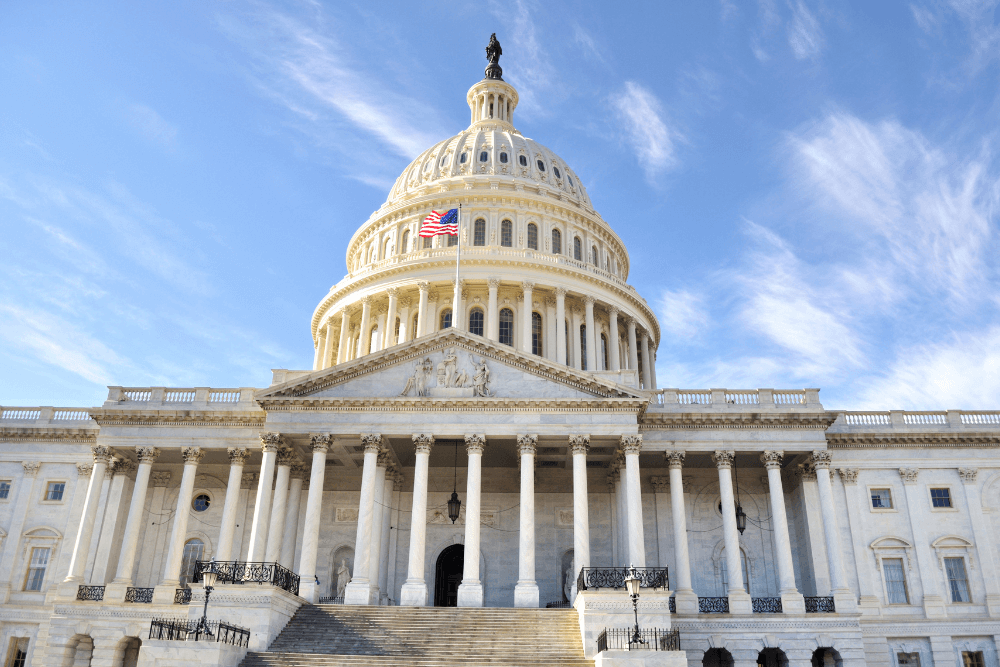
FOR IMMEDIATE RELEASE
September 25, 2024
CONTACT:
Aaron Smith, CEO and Co-Founder
(888) 683-5650, Aaron@TheCannabisIndustry.org
Landmark Legislation to Regulate Legal Hemp Products Introduced in U.S. Senate
Cannabis industry advocates applaud Sen. Wyden for measured approach to controlling adult products
WASHINGTON, D.C. – Today, Sen. Ron Wyden (D-Ore.) introduced the Cannabinoid Safety and Regulation Act, legislation that would direct the Food & Drug Administration (FDA) and the Alcohol Tax Tobacco & Trade Bureau (TTB) to regulate intoxicating hemp products which are currently already legal throughout the United States.
Congress legalized hemp and hemp-derived cannabinoid products containing less than 0.3% THC when it approved the 2018 Farm Bill but it did not implement a regulatory framework for these products. Sen. Wyden’s legislation seeks to address that lack of clarity.
The Cannabinoid Safety and Regulation Act (CSRA) would prohibit the marketing and sale of products containing intoxicating cannabinoids, such as THC, to minors under 21. The bill also bans the use of dangerous chemicals in the manufacturing process for hemp products and creates rules for testing and labeling these products for legal sales to adults, among other controls.
Cannabis industry advocates and other stakeholders have long been concerned about the proliferation of unregulated hemp products and see the CSRA as a significant positive step toward resolving that issue.
“For too long, federal inaction has fostered an unregulated marketplace for intoxicating hemp products, endangering the public and creating unfair competition for regulated cannabis businesses,” stated National Cannabis Industry Association CEO, Aaron Smith.
“The Cannabinoid Safety and Regulation Act solves this problem by implementing commonsense safeguards to ensure intoxicating hemp products are tested, properly labeled, and not made available to minors while creating a pathway for manufacturers to provide safe hemp products to adults through a regulated framework. We commend Senator Wyden for his leadership on this issue and look forward to helping to advance this legislation in Congress.”
The debate surrounding cannabinoid products has led to some efforts to prohibit hemp-derived products entirely, including an temporary ban instituted as an emergency rule in California earlier this week.
“The vast majority of manufacturers of hemp products are responsible actors, already adhering to best practices and calling for regulations such as the bill introduced by Senator Wyden. Applying the failed policies of prohibition to these products rather than moving swiftly toward state and federal regulations is a backward-looking approach and doesn’t address the underlying public health concerns related to these products,” added Smith.
Full text of the Cannabinoid Safety and Regulation Act can be viewed here and a summary of the bill is available here.
The total size of the U.S. hemp-derived cannabinoid market was estimated to be $28.4 billion in 2023, according to a report from leading cannabis economics firm, Whitney Economics. This is the same size as the nation’s craft beer industry.
###
The National Cannabis Industry Association (NCIA) is the largest cannabis trade association in the U.S. and the only organization representing small and independent cannabis-related businesses at the national level. NCIA promotes the growth of a responsible, sustainable, and inclusive cannabis industry and works for a favorable social, economic, and regulatory environment for that industry throughout the United States.
Overwhelming Support for Marijuana Rescheduling Expressed in Public Comments to the Department of Justice
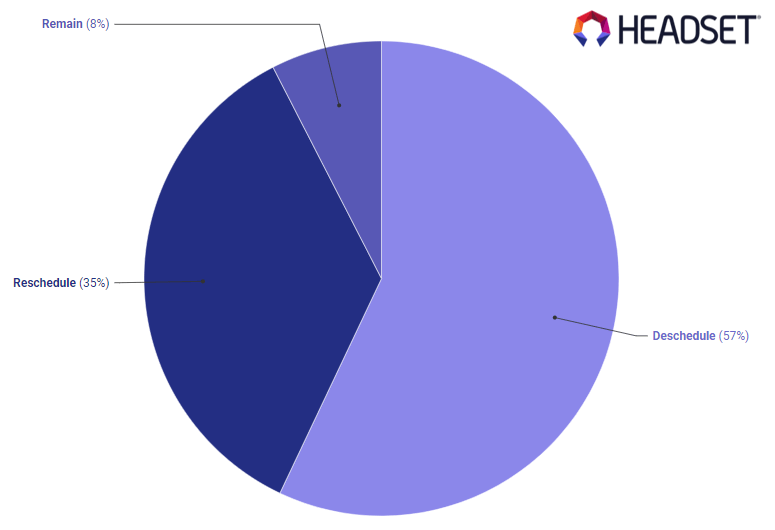
FOR IMMEDIATE RELEASE
July 23, 2024
CONTACT:
Aaron Smith, NCIA CEO and Co-Founder
(888) 683-5650, Aaron@TheCannabisIndustry.org
Cy Scott, Headset CEO
(888) 784-3237, cy@headset.io
Overwhelming Support for Marijuana Rescheduling Expressed in Public Comments to the Department of Justice
Cannabis industry advocates press for swift reclassification accompanied by guidance that protects existing state-based cannabis programs
WASHINGTON, D.C. – A sixty-day public comment period for the Department of Justice’s proposal to reclassify marijuana from a Schedule I to a Schedule III substance in the Controlled Substances Act closed last night.
More than 40,000 comments were submitted by various agencies, organizations, academics, and concerned citizens. An overwhelming 91% of comments were submitted in favor of the rescheduling proposal or making it legal under federal law, according to an analysis of the data conducted by Headset. The analysis found that among those supporting a change 56% advocated for complete descheduling of cannabis and 35% supported rescheduling to a less restrictive category.
The National Cannabis Industry Association (NCIA) submitted comments supporting the proposal to move cannabis to Schedule III and is also calling for administrativeguidance to ensure that state cannabis programs are protected from federal interference. The association, which represents over 500 legal cannabis businesses, also called on further action to remove cannabis from the Controlled Substances Act (CSA) and establish federal regulations for the drug.
“It’s clear: decades of scientific data, medical literature, and the experience of millions of American patients using it legally under the care of a physician all show that marijuana absolutely does not belong in Schedule I of the CSA. Reclassifying marijuana to Schedule III is a positive first step in aligning federal and state law, however, we continue to assert that removing marijuana from the CSA entirely would be the best and most appropriate action.
We again emphasize that any reclassification of marijuana should be accompanied by guidance to ensure successful state programs are not disrupted by inappropriate federal enforcement of the CSA. Public health and safety are best served by the elimination of the illicit market and the regulation of marijuana and marijuana products. We urge the relevant departments to move expeditiously in publishing the final rule related to this topic,” NCIA’s comments conclude.
NCIA also submitted statements from dozens of members attesting to the successes seen with state cannabis regulation as well as the medical value of cannabis.
Read NCIA’s complete comments here.
Just over half of Americans live in a state that has made cannabis legal for adults over 21 and three out of four Americans live in a state that has legalized cannabis for medical use. A November 2023 Gallup survey found that 70% of Americans support making cannabis legal for adults and a recent Pew Research Center poll found that less than 10% of Americans still support marijuana prohibition.
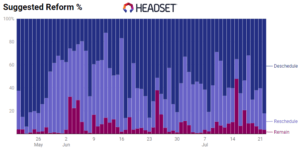

###
The National Cannabis Industry Association (NCIA) is the largest cannabis trade association in the U.S. and the only organization representing small and independent cannabis-related businesses at the national level. NCIA promotes the growth of a responsible, sustainable, and inclusive cannabis industry and works for a favorable social, economic, and regulatory environment for that industry throughout the United States.
National Cannabis Industry Association Seeks Regulation of Intoxicating Hemp Products as House Agriculture Committee Considers Farm Bill

FOR IMMEDIATE RELEASE
May 23, 2024
CONTACT:
Aaron Smith, CEO and Co-Founder
(888) 683-5650, Aaron@TheCannabisIndustry.org
National Cannabis Industry Association Seeks Regulation of Intoxicating Hemp Products as House Agriculture Committee Considers Farm Bill
Position paper calls for parity between hemp and marijuana in federal regulatory framework; increasing THC limit for crops to meet international standards
Washington, D.C. — Today, The House Committee on Agriculture is conducting a hearing on the Farm Bill, which is up for its 5-year renewal after being continued from last year. The 2018 Farm Bill made the production and sale of hemp and hemp products legal for the first time in decades.
Cannabis industry advocates strongly support the continued legal access to hemp products and are calling on Congress to regulate products containing intoxicating THC derived from hemp. Proposed controls on these products largely mirror what is already being done to regulate marijuana products and alcohol, such as third party safety testing, product labeling, and restricting sales to adults over 21.
The National Cannabis Industry Association (NCIA) recently published a position paper “Navigating the Future of Cannabinoid Regulation: Balancing Safety, Innovation, and Consumer Access,” which calls for a new federal regulatory framework for intoxicating cannabinoid products derived from hemp, marijuana, or biosynthesis.
NCIA is calling on Congress to increase the total allowance for total THC in hemp crops from 0.3% to 1%, which is consistent with the policies of other hemp-producing nations. The current low THC threshold has forced many farmers to exit the industry for fear that they will have to destroy an entire crop if the total content is slightly above this arbitrary threshold. The association is also advocating for reasonable limitations on THC content per-serving for finished hemp-derived products that match align with dosage limits outlined in state programs (typically 5-10 mg per-serving).
“Congress has the opportunity to protect public health and safety while fostering the success of thousands of small businesses in the cannabis industry by enacting sensible regulations for both hemp- and marijuana-derived cannabinoid products,” said Aaron Smith, CEO & Co-founder of the National Cannabis Industry Association. “The hemp-derived THC business is booming in this country and these products are here to stay. It’s just common sense to enact regulations that ensure they are tested for safety and potency, labeled accordingly, and not made available to minors.”
Just over half of Americans live in a state that has made cannabis legal for adults over 21 and three out of four Americans live in a state that has legalized cannabis for medical use. A November 2023 Gallup survey found that 70% of Americans support making cannabis legal for adults and a recent Pew Research Center poll found that less than 10% of Americans still support marijuana prohibition.
Laws to make cannabis legal for adults have passed in 24 states as well as the District of Columbia and the territories of CNMI and Guam, and 38 states as well as several territories have comprehensive medical cannabis laws.
###
The National Cannabis Industry Association (NCIA) is the largest cannabis trade association in the U.S. and the only organization representing small and independent cannabis-related businesses at the national level. NCIA promotes the growth of a responsible, sustainable, and inclusive cannabis industry and works for a favorable social, economic, and regulatory environment for that industry throughout the United States.
Cannabis Industry Applauds President Biden’s Commitment to Reschedule Marijuana During Annual Visit to Capitol Hill
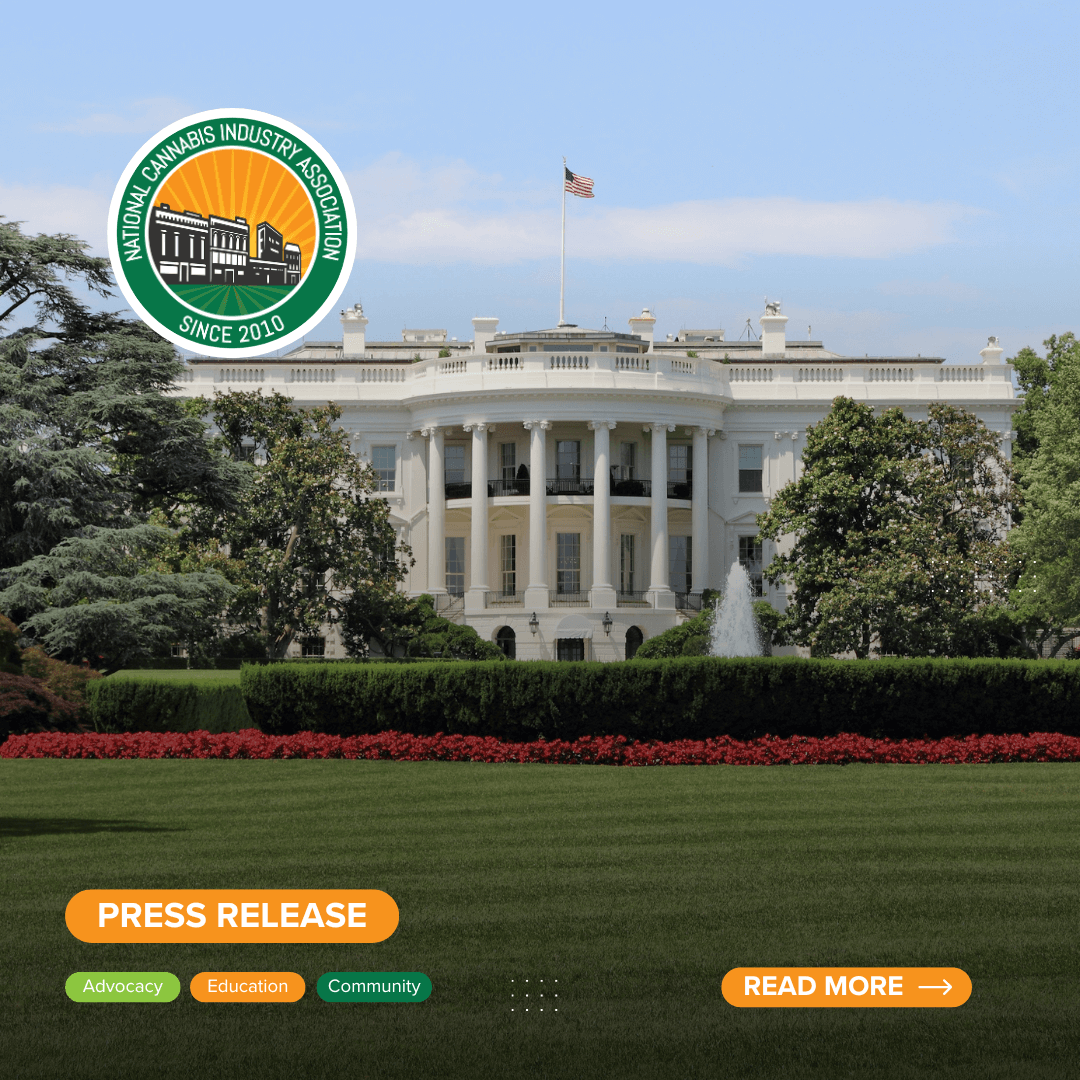
FOR IMMEDIATE RELEASE
May 16, 2024
CONTACT:
Aaron Smith, CEO and Co-Founder
(888) 683-5650, Aaron@TheCannabisIndustry.org
Cannabis Industry Applauds President Biden’s Commitment to Reschedule Marijuana During Annual Visit to Capitol Hill
Business leaders participate in annual Cannabis Industry Lobby Days to advocate for state cannabis programs as DEA prepares to reclassify the drug
Washington, D.C. – Today, President Joe Biden announced that the Department of Justice is reclassifying cannabis from its Schedule I status in the Controlled Substances Act. The administration is poised to initiate the rulemaking process that will open a 60 day public comment period before the change is made official.
This announcement comes just minutes after the National Cannabis Industry Association (NCIA) concluded its 12th Annual Cannabis Industry Lobby Days in Washington, D.C., the largest advocacy event for the legal industry.
Over the course of the two-day event, more than 100 cannabis business professionals held citizen lobbying meetings with congressional offices to discuss the positive economic and social impact that regulating cannabis markets has already had on states with modern marijuana laws. Participants advocated for federal reforms that need to be enacted after rescheduling, such as legislation that would allow banks to more easily do business with the legal cannabis industry and broader reforms that would regulate cannabis like alcohol.
Rescheduling, while hailed as an incremental win for the legal cannabis industry, would not legalize marijuana or harmonize federal law with the laws that allow for either medical or adult-use cannabis sales in 38 states nor does it right the wrongs of decades of misguided prohibition policies.
“On behalf of thousands of legal businesses operating across the country, we commend President Biden for taking this important first step toward a more rational marijuana policy. Now it’s time for Congress to enact legislation that would protect our industry, uphold public safety, and advance the will of the voters who overwhelmingly support making cannabis legal for adults,” said Aaron Smith, NCIA CEO & Co-founder. “Rescheduling alone does not fix our nation’s state and federal cannabis policy conflict. Only Congress can enact the legislation needed to fully respect the states and advance the will of the vast majority of voters who support legal cannabis.”
Reclassifying marijuana from Schedule I to Schedule III in the Controlled Substances Act would provide tax parity for the cannabis industry by ensuring legal businesses would no longer be subject to an arcane provision of the U.S. tax code — Section 280E — that prohibits deductions associated with “drug trafficking.”
NCIA will be submitting public comments during the rulemaking period on behalf of the hundreds of small businesses it represents in the legal cannabis industry. In addition to calling on legislation that would carve out a new regulatory pathway for cannabis products, the association supports legislation that would provide retroactive relief for lawful businesses with tax liability associated with Section 280E.
Laws to make cannabis legal for adults have passed in 24 states as well as the District of Columbia and the territories of CNMI and Guam, and 38 states as well as several territories have comprehensive medical cannabis laws.
Just over half of Americans live in a state that has made cannabis legal for adults over 21 and three out of four Americans live in a state that has legalized cannabis for medical use. A November 2023 Gallup survey found that 70% of Americans support making cannabis legal for adults and a recent Pew Research Center poll found that less than 10% of Americans still support marijuana prohibition.
###
The National Cannabis Industry Association (NCIA) is the largest cannabis trade association in the U.S. and the only organization representing small and independent cannabis-related businesses at the national level. NCIA promotes the growth of a responsible, sustainable, and inclusive cannabis industry and works for a favorable social, economic, and regulatory environment for that industry throughout the United States.
Drug Enforcement Administration to Initiate Historic Shift in Federal Marijuana Policy
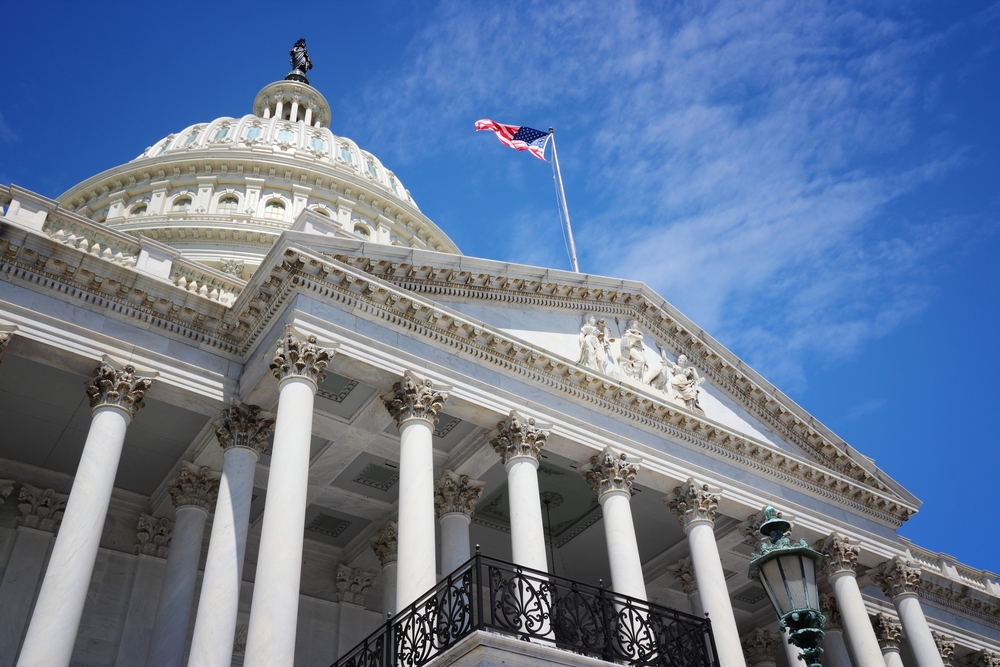
FOR IMMEDIATE RELEASE
April 30, 2024
CONTACT:
Aaron Smith, CEO and Co-Founder
(888) 683-5650, Aaron@TheCannabisIndustry.org
Michelle Rutter Friberg, Director of Government Relations
(202) 599-9743, Michelle@TheCannabisIndustry.org
Drug Enforcement Administration to Initiate Historic Shift in Federal Marijuana Policy
Cannabis industry advocates hail rescheduling as a significantly positive first step in the national effort to end prohibition and call on Congress to enact broader reforms
WASHINGTON, D.C. – Today, the Associated Press reported that the U.S. Drug Enforcement Administration (DEA) is planning to move cannabis from Schedule I status to Schedule III in the federal Controlled Substances Act. This historic move that acknowledges the medical benefits of cannabis products still needs to be reviewed by the White House Office of Management and Budget before the DEA initiates a public comment period.
Marijuana and its most well known psychoactive compound, THC, have been listed as Schedule I substances in the federal Controlled Substances Act since 1970, a designation reserved for drugs with high potential for abuse and no medical value. A move to Schedule III acknowledges the medicinal value of cannabis that has been known to the medical community and millions of patients using it under the care of their physicians for decades.
Rescheduling would not resolve the conflict that exists between federal law and the laws on the books in 38 states which have regulated the legal production and sale of cannabis for medical or adult use but a move to Schedule III would provide federal tax parity to state-legal cannabis businesses by allowing them to take deductions for ordinary expenses currently prohibited under a little-known provision of the federal tax code.
The cannabis industry widely agrees that rescheduling as a significant positive step but that broader federal reforms are needed to resolve the myriad issues plaguing the industry resulting from federal prohibition.
“Moving marijuana out of its absurd classification as a Schedule I drug is long overdue and we applaud the administration for finally acknowledging the therapeutic value that has been widely accepted by the medical community and millions of medical cannabis patients for decades,” said National Cannabis Industry Association CEO, Aaron Smith. “While this is undoubtedly a very positive first step, rescheduling will not end federal marijuana prohibition and doesn’t harmonize federal law with the laws allowing some form of legal cannabis in the vast majority of the states. In order for this move to be meaningful on the ground, we need clear enforcement guidelines issued to the DEA and FDA that would ensure the tens of thousands of state-licensed businesses responsibly serving cannabis to adults are not subject to sanctions or criminal prosecution under federal laws.”
“Further, it’s imperative that Congress build upon this development by passing comprehensive legislation to remove cannabis from the Controlled Substances Act and forge a new regulatory framework for whole plant cannabis products.” added Smith.
Just over half of Americans live in a state that has made cannabis legal for adults over 21 and three out of four Americans live in a state that has legalized cannabis for medical use. A November 2023 Gallup survey found that 70% of Americans support making cannabis legal for adults and a recent Pew Research Center poll found that less than 10% of Americans still support marijuana prohibition.
# # #
The National Cannabis Industry Association (NCIA) is the largest cannabis trade association in the U.S. and the only national organization representing small and independent cannabis-related businesses. NCIA promotes the growth of a responsible, sustainable, and inclusive cannabis industry and works for a favorable social, economic, and regulatory environment for that industry throughout the United States.
FundCanna Partners with National Cannabis Industry Association to Fund Memberships

FundCanna Partners with National Cannabis Industry Association to Fund Memberships
Leading cannabis lender will be funding the membership fees of their next 100 clients
SAN DIEGO, Nov. 14, 2023 — FundCanna, the leading provider of capital to businesses throughout the cannabis sector, announces today a partnership with the National Cannabis Industry Association (NCIA), the largest cannabis trade organization, to cover the NCIA membership costs for their next 100 customers, a $100,000 value. The company has also elevated its own membership to the Evergreen level, a significant investment in the trade organization.
This commitment from FundCanna to NCIA will support the work needed to advance cannabis policy, reduce the heavy tax burden on cannabis companies and ensure that the industry’s voice is heard at the federal, state and municipal levels.
“Our partnership with the NCIA is a win for both cannabis businesses and the industry as a whole,” said Adam Stettner, Founder and CEO of FundCanna. “Through FundCanna, cannabis companies get the access to capital that they need to grow and operate their businesses and now they will also receive a subsidized membership to the NCIA which both amplifies their voices and provides them a seat at the table for some of the most important discussions and decisions that are facing our industry. We believe this commitment to the cannabis industry, our clients and NCIA will lead to more positive momentum for cannabis policy reform across the country.”
An unprecedented partnership for NCIA, FundCanna is the first company to back the cannabis trade group at this level. By funding memberships for their clients to NCIA, FundCanna hopes to enable more cannabis businesses to have a seat at the table for important policy discussions with the proper stakeholders.
“FundCanna has doubled down on its commitment to the cannabis industry,” said Aaron Smith, CEO of NCIA. “With pending cannabis legislation and more states passing cannabis legalization measures every year, NCIA’s work is more important than ever, and we welcome FundCanna and its clients to support and advocate for the cannabis policy reform NCIA is championing. This financial commitment and the additional members and their voices will make a significant difference in our progress toward advancing many of the initiatives that matter most to cannabis businesses nationwide. These include SAFER Banking, ensuring federal rescheduling doesn’t upend the industry, and much more including our efforts to eventually make cannabis legal from coast to coast.”
This program applies to the first 100 cannabis companies that fund with FundCanna as a new client beginning Nov. 15th, 2023. Membership will be provided following the successful application, underwriting and funding through FundCanna’s process. Cannabis companies interested in learning more about this partnership can visit fundcanna.com/ncia.
About FundCanna
FundCanna is the leading source of debt capital to the cannabis industry. The funding products FundCanna offers are customizable, flexible, renewable and reliable. The financing offered is designed exclusively for Cannabis operations and the ancillary companies that support the industry.
For more than 20 years, their team of financial experts has provided nearly $20 billion in funding to underserved businesses and individuals across the country. Adam Stettner, founder and CEO, has successfully founded and run finance companies for the past 20 plus years, earning numerous national awards and recognition notably including EY’s Entrepreneur of the Year and 7 showings on the Inc. 500/5000.
Stettner and his team focused their efforts exclusively on financing licensed Cannabis operators and ancillary providers in 2021. For more information about cannabis financing, visit FundCanna.com.
About NCIA
The National Cannabis Industry Association (NCIA) is the largest cannabis trade association in the U.S. and the only organization representing independent cannabis-related businesses at the national level. NCIA promotes the growth of a responsible, sustainable, and inclusive cannabis industry and works for a favorable social, economic, and regulatory environment for that industry throughout the United States.
Media Contact:
Anne Donohoe
KCSA Strategic Communications
fundcanna@kcsa.com
Senate Committee Approves Historic Cannabis Banking Legislation
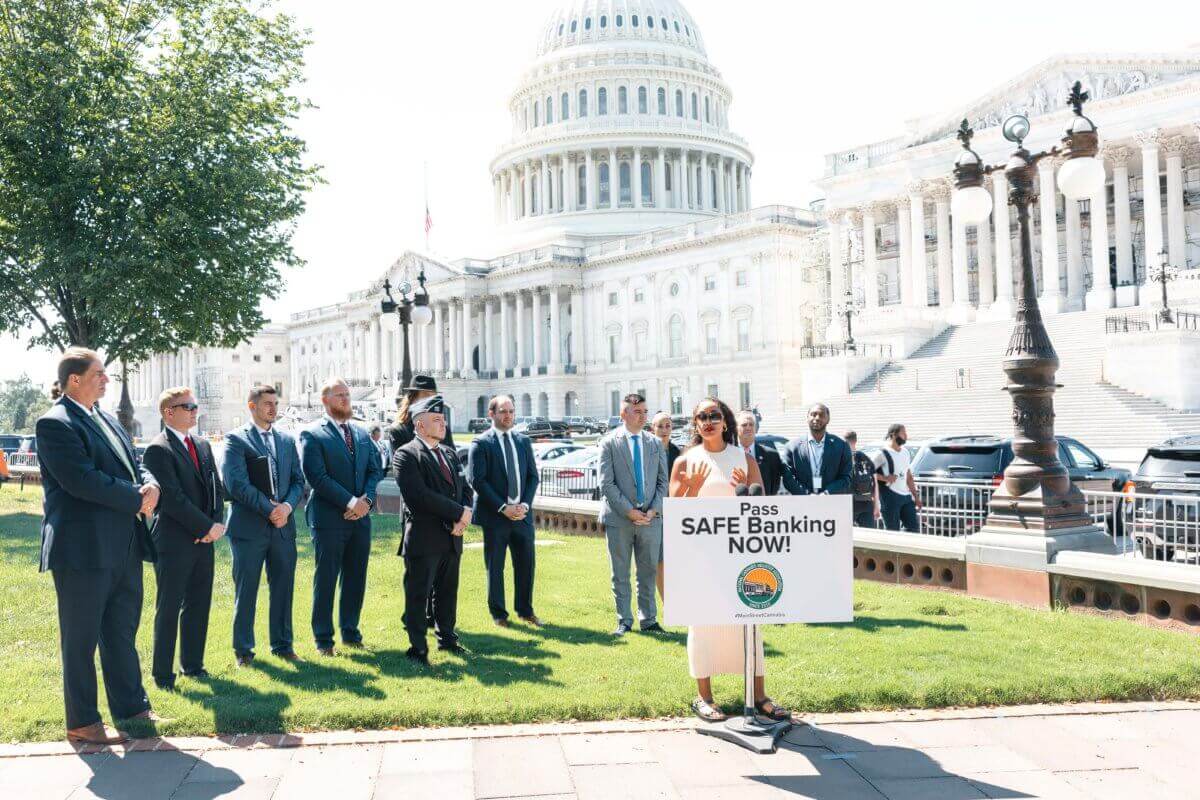
FOR IMMEDIATE RELEASE
Tuesday, September 27, 2023
CONTACT:
Aaron Smith, CEO and Co-Founder
(888) 683-5650, Aaron@TheCannabisIndustry.org
Michelle Rutter Friberg, Director of Government Relations
(202) 599-9743, Michelle@TheCannabisIndustry.org
Senate Committee Approves Historic Cannabis Banking Legislation
Cannabis industry advocates applaud move that sets the stage for SAFER Banking Act to receive Senate floor vote
WASHINGTON, D.C. – Today the Senate Banking Committee approved the Safe and Secure Enforcement and Regulation (SAFER) Banking Act, clearing the way for a floor vote. The legislation, introduced by Sens. Jeff Merkley (D-OR) and Steve Daines (R-MT), would allow financial institutions to do business with the legal cannabis industry without fear of running afoul of federal banking regulations. The legislation cleared the committee with a 14-to-9 vote.
The SAFER Banking Act would afford the cannabis industry better access to financial services that are currently unavailable or not reliably accessible, including depository services, electronic payments, and lending. The bi-partisan legislation has passed in the House seven times in previous congressional sessions but has yet to receive a vote in the Senate. Today’s committee vote clears a path for the bill to finally make its way to the Senate floor for a vote.
During the markup session, multiple amendments were offered. One, from Senator Warnock (D-GA) would have created a 5-year sunset for the legislation unless a report from the Treasury Department certified that it had decreased the racial wealth gap and ameliorated other negative economic impacts of the war on drugs. This amendment ultimately failed. Additionally, amendments from Senators Hagerty (R-TN), Rounds (R-SD), Crapo (R-ID) were also offered but were ruled out of order, withdrawn, and failed, respectively.
Advocates are hopeful the Senate will approve the SAFER Banking Act given the strong bipartisan support. 76 Senators represent a state that regulates the sale of cannabis for medical or adult-use — including 28 Republicans.
“The committee’s approval of the SAFER Banking Act which gives hope to thousands of compliant, tax-paying businesses desperately trying to access the basic financial services other businesses take for granted,” said National Cannabis Industry Association CEO, Aaron Smith. “This uniquely bipartisan legislation has the potential to save lives and help small businesses; it’s time for Congress to get it to the president’s desk without further delay.”
Last month, the Department of Health and Human Services and the Food and Drug Administration made an official recommendation to move cannabis from Schedule I to Schedule III status in the federal Controlled Substances Act but that change would not affect the current banking situation for the industry.
The SAFER Banking Act is endorsed by the National Association of Attorneys General, National Association of State Treasurers, the American Bankers Association, Credit Union National Association, Independent Community Bankers of America, the NAACP, Americans for Prosperity, United Food and Commercial Workers Union, and a bipartisan group of 20 state governors.
Laws to make cannabis legal for adults have passed in 23 states as well as the District of Columbia and the territories of CNMI and Guam, and 38 states as well as several territories have comprehensive medical cannabis laws. Three in four Americans live in a state where cannabis is legal in some form.
###
The National Cannabis Industry Association (NCIA) is the largest cannabis trade association in the U.S. and the only organization representing small and independent cannabis-related businesses at the national level. NCIA promotes the growth of a responsible, sustainable, and inclusive cannabis industry and works for a favorable social, economic, and regulatory environment for that industry throughout the United States.
Senate Committee to Markup Cannabis Banking Legislation Tomorrow

FOR IMMEDIATE RELEASE
Tuesday, September 26, 2023
CONTACT:
Aaron Smith, CEO and Co-Founder
(888) 683-5650, Aaron@TheCannabisIndustry.org
Michelle Rutter Friberg, Director of Government Relations
(202) 599-9743, Michelle@TheCannabisIndustry.org
Senate Committee to Markup Cannabis Banking Legislation Tomorrow
Industry leaders and advocates stress urgent need for bi-partisan SAFER Banking Act
WASHINGTON, D.C. – The Senate Banking Committee will be marking up the Safe and Secure Enforcement and Regulation (SAFER) Banking Act during its executive session tomorrow at 9:30 a.m. EST. The legislation, introduced by Sens. Jeff Merkley (D-OR) and Steve Daines (R-MT), would allow financial institutions to do business with the legal cannabis industry without fear of running afoul of federal banking regulations.
The legislation, S. 2860, enjoys broad bipartisan support and has passed the House seven times in previous congressional sessions but has never been taken up for a vote in the Senate. Advocates are hopeful that the Banking Committee will release the bill to a floor vote tomorrow.
The SAFER Banking Act (formerly known as “SAFE Banking Act”) is narrowly-crafted legislation that would allow the cannabis industry to access financial services currently not available or not reliably accessible without steep bank fees. Current banking regulations force cannabis businesses to operate in a very cash-heavy environment as they are unable to process credit cards and sometimes even unable to access depository services. The situation has led to numerous robberies and violent crimes targeting cannabis retail facilities and industry employees.
The bill would also open the door to greater business lending in the industry, providing access to capital that advocates say is sorely needed by small and independently-owned cannabis businesses.
“The vast majority of Americans now live in a state that is effectively regulating legal medical or adult-use cannabis sales but federal banking regulations are exposing millions to an unnecessary and completely avoidable risk of violent crime,” said National Cannabis Industry Association CEO, Aaron Smith. “On behalf of the tens of thousands of small businesses struggling under these outdated federal banking regulations, we commend Chairman Brown and the committee for taking up this important issue and urge them to move the SAFER Banking Act to a full Senate vote without further delay.”
Last month, the Department of Health and Human Services and the Food and Drug Administration made an official recommendation to move cannabis from Schedule I to Schedule III status in the federal Controlled Substances Act but that change would not affect the current banking situation for the industry.
The SAFER Banking Act is endorsed by the National Conference of State Legislators, National Association of Attorneys General, National Association of State Treasurers, the American Bankers Association, Credit Union National Association, Independent Community Bankers of America, the NAACP, Americans for Prosperity, United Food and Commercial Workers Union, and a bipartisan group of 20 state governors.
Laws to make cannabis legal for adults have passed in 23 states as well as the District of Columbia and the territories of CNMI and Guam, and 38 states as well as several territories have comprehensive medical cannabis laws. Three in four Americans live in a state where cannabis is legal in some form.
# # #
The National Cannabis Industry Association (NCIA) is the largest cannabis trade association in the U.S. and the only national organization representing small and independent cannabis-related businesses. NCIA promotes the growth of a responsible, sustainable, and inclusive cannabis industry and works for a favorable social, economic, and regulatory environment for that industry throughout the United States.
National Cannabis Industry Association Responds to Health & Human Services Recommendation on Marijuana Scheduling
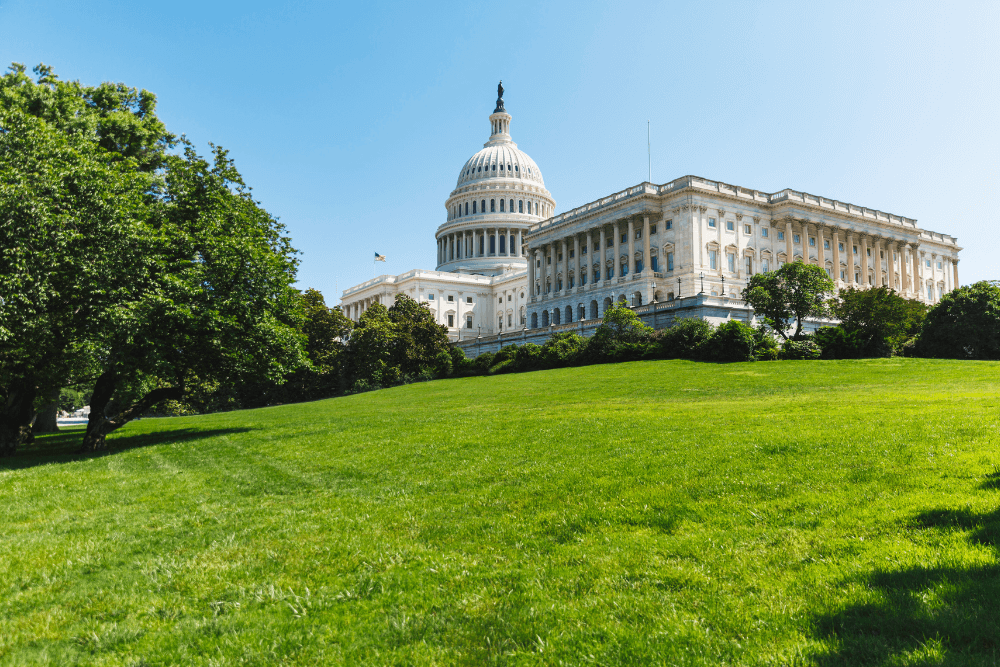
FOR IMMEDIATE RELEASE
Wednesday, August 30, 2023
CONTACT:
Aaron Smith, CEO and Cofounder
(888) 683-5650, Aaron@TheCannabisIndustry.org
National Cannabis Industry Association Responds to Health & Human Services Recommendation on Marijuana Scheduling
WASHINGTON, D.C. – It’s been reported today that the U.S. Department of Health and Human Services (HHS) issued an official recommendation to the Drug Enforcement Administration calling for marijuana to be moved from Schedule I to Schedule III status in the federal Controlled Substances Act.
Advocates acknowledged this historic move in the long fight to end marijuana prohibition but point out the rescheduling would not resolve many of the issues plaguing state cannabis markets.
“Moving cannabis to schedule III could have some limited benefit but does nothing to align federal law with the 38 U.S. states which have already effectively regulated cannabis for medical or adult use. The only way to fully resolve the myriad of issues stemming from the federal conflict with state law is to remove cannabis from the Controlled Substances Act and regulate the product in a manner similar to alcohol.” said National Cannabis Industry Association CEO Aaron Smith.
“The vast majority of Americans live in states with laws that depart from federal law on this issue and where thousands of regulated Main Street businesses are serving the legal cannabis market safely and responsibly. It’s long past time for Congress to truly harmonize federal policy with those states.”
Marijuana is currently classified as a Schedule I substance, a status reserved for drugs with high potential for abuse and no medical value. This nonbinding recommendation acknowledges decades of scientific data suggesting Schedule I status is inappropriate.
Laws to make cannabis legal for adults have passed in 23 states as well as the District of Columbia and the territories of CNMI and Guam, and 38 states as well as several territories have comprehensive medical cannabis laws. Three in four Americans live in a state where cannabis is legal in some form.
###
The National Cannabis Industry Association (NCIA) is the largest cannabis trade association in the U.S. and the only organization focused on representing small and independent cannabis-related businesses at the national level. NCIA promotes the growth of a responsible, sustainable, and inclusive cannabis industry and works for a favorable social, economic, and regulatory environment for that industry throughout the United States.
Senate Committee Holds Cannabis Banking Hearing as Industry Advocates Prepare for Annual Fly-in Event
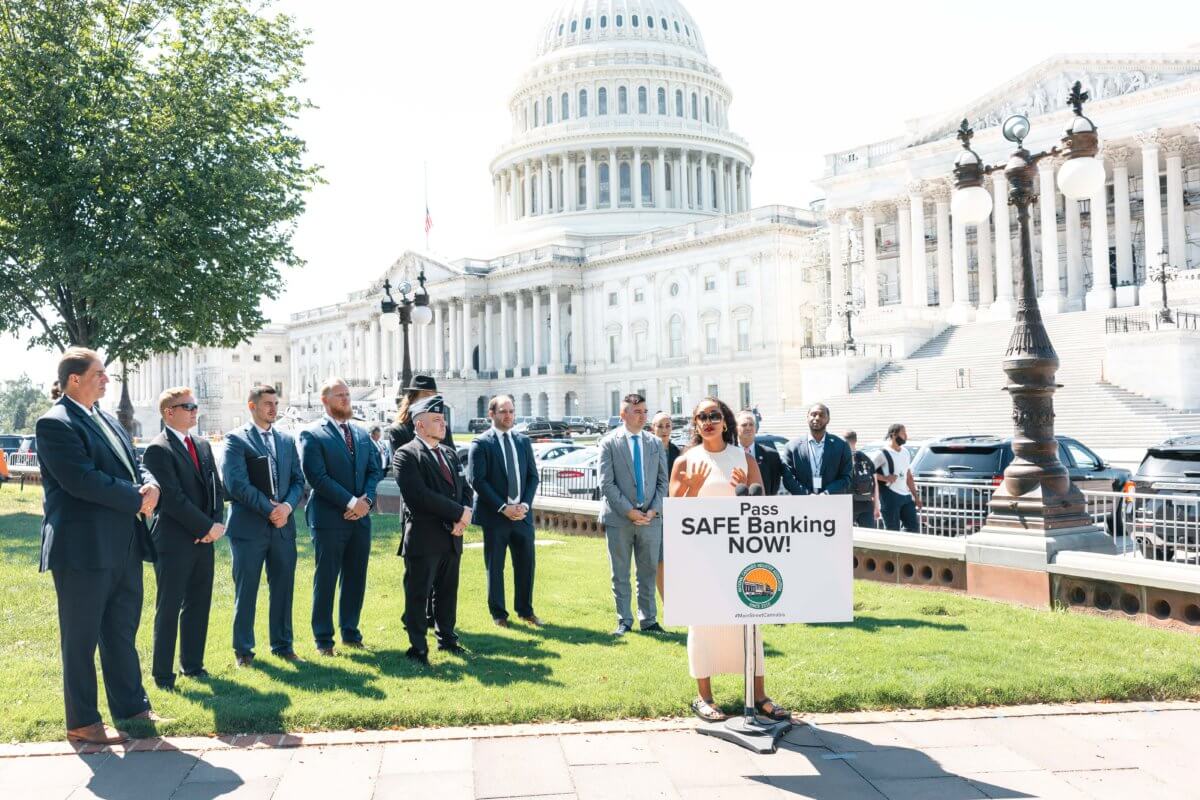
FOR IMMEDIATE RELEASE
Thursday, May 11, 2023
CONTACT:
Aaron Smith, CEO and Cofounder
(888) 683-5650, Aaron@TheCannabisIndustry.org
Bethany Moore, Communications Director
(240) 678-2654, Communications@TheCannabisIndustry.org
Senate Committee Holds Cannabis Banking Hearing as Industry Advocates Prepare for Annual Fly-in Event
Over 100 Cannabis Business Leaders Will Join Lawmakers Calling for Congressional Action on the SAFE Banking Act and Other Priorities Next Week
WASHINGTON, D.C. – The Senate Committee on Banking, Housing, and Urban Affairs conducted an oversight hearing today to examine the challenges federal banking policy poses to cannabis businesses, their employees, and the states that regulate them. Witnesses included Sen. Jeff Merkley (D-OR) and Sen. Steve Daines (R-MT) who provided testimony outlining the difficulties their states are facing due to a lack of access to banking in the cannabis industry.
Senators Merkley and Daines recently introduced the Secure and Fair Enforcement (SAFE) Banking Act, along with 38 original cosponsors. The legislation would amend federal statute to allow banks and financial institutions to do business with the cannabis industry without fear of running afoul of federal laws intended to keep illegal drug transactions out of the banking system. The House has passed its version of the SAFE Banking Act with wide bipartisan margins seven times during previous congresses.
Advocates are pleased the Senate is taking up this issue and are urging Senate leadership to schedule a committee hearing and markup for the SAFE Banking Act (S.1323) as soon as possible.
In his written testimony to the committee, National Cannabis Industry Association (NCIA) co-founder and chief executive officer Aaron Smith underscored the need for immediate congressional action on the cannabis banking issue.
“Comprehensive reforms that would align federal law with the growing number of states regulating cannabis and end the harms associated with decades of failed prohibition are sorely needed. However, the legislative process to achieve those reforms is likely to take several more years and the crisis states are facing due to outdated banking policy demands urgent action,” wrote Smith. “The Senate has a unique opportunity to solve the dangerous and unnecessary crisis by passing the Secure and Fair Enforcement (SAFE) Banking Act.”
The hearing serves as a significant precursor to the NCIA’s 11th Annual Lobby Days, taking place in Washington, D.C. next week. Cannabis industry professionals and advocates from across the nation will travel to the capital to discuss key issues with lawmakers, including the banking challenges discussed in the oversight hearing.
The association’s advocacy fly-in will take place May 17th and 18th and will include a reception with members of Congress and VIPs hosted by leading national law and public affairs firm Michael Best Strategies on the evening of the 17th as well as a morning briefing for Senate staff and members of the media on the cannabis banking issue on the 18th.
Over the course of the event, over 150 meetings will be held with Congressional representatives to discuss the negative impact that outdated federal prohibition has on the legal cannabis industry and to advocate for the passage of the SAFE Banking Act.
Industry advocates and lawmakers will be available for comment during the Senate briefing Thursday.
WHAT: Senate Staff Briefing on the SAFE Banking Act & NCIA’s 11th Annual Cannabis Industry Lobby Days
WHEN: Thursday, May 18, 2023, 9:00 AM Eastern
WHERE: 325 Russell Senate Office Building, Capitol Hill, Washington, D.C.
WHO: National Cannabis Industry Association members and leadership and members of Congress TBA
Members of the media may request a press credential for the briefing by contacting Bethany Moore at media@thecannabisindustry.org.
# # #
The National Cannabis Industry Association (NCIA) is the largest cannabis trade association in the U.S. and the only organization focused on representing small and independent cannabis-related businesses at the national level. NCIA promotes the growth of a responsible, sustainable, and inclusive cannabis industry and works for a favorable social, economic, and regulatory environment for that industry throughout the United States.
SAFE Banking Act Reintroduced in the U.S House and Senate
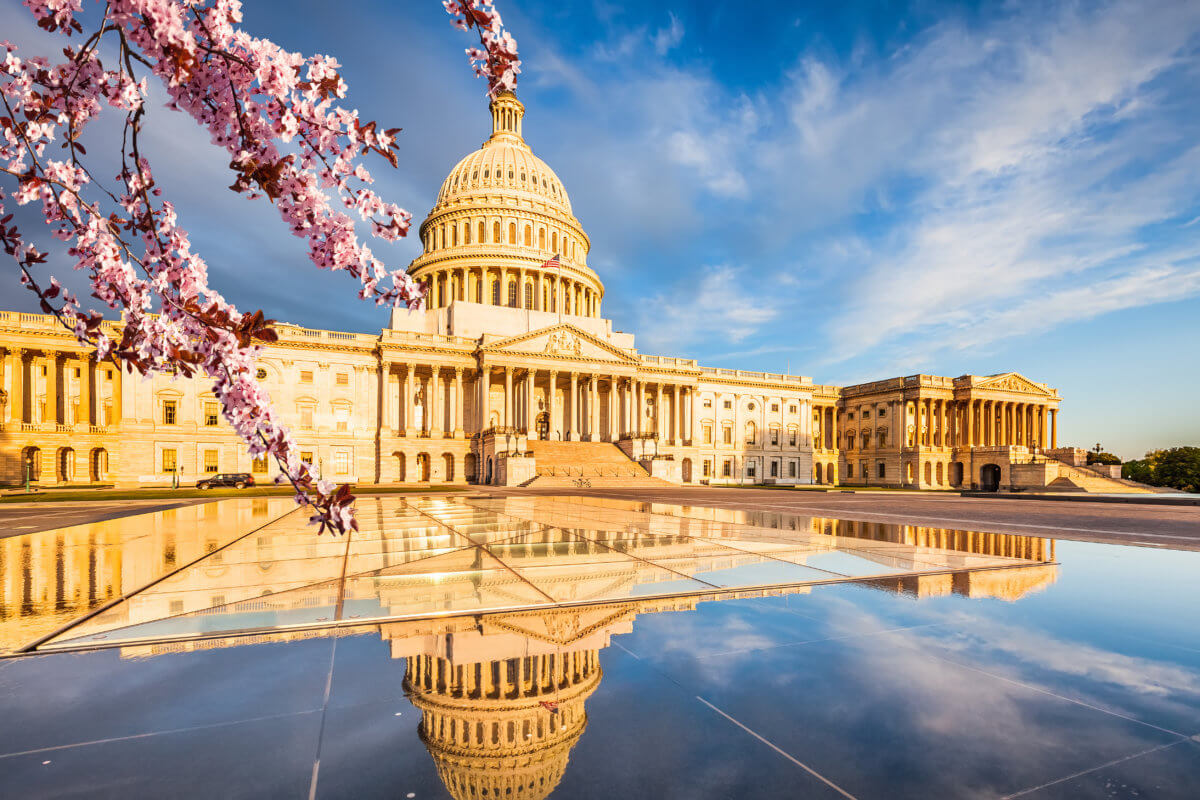
FOR IMMEDIATE RELEASE
Wednesday, April 26, 2023
CONTACT:
Aaron Smith, CEO and Cofounder
(888) 683-5650, Aaron@TheCannabisIndustry.org
Bethany Moore, Communications Director
(240) 678-2654, Communications@TheCannabisIndustry.org
SAFE Banking Act Reintroduced in the U.S House and Senate
Advocates call for passage of bipartisan SAFE Banking Act to open the financial system to licensed cannabis businesses
WASHINGTON, D.C. – Today, a bipartisan group of lawmakers reintroduced the Secure and Fair Enforcement (SAFE) Banking Act in the U.S. Senate and House of Representatives. This bicameral legislation, which was introduced by Sen. Jeff Merkley (D-OR), Sen. Steve Daines (R-MT), Rep. Dave Joyce (R-OH), and Rep. Earl Blumenauer (D-OR), would protect financial institutions from federal prosecution for providing services to cannabis businesses operating in compliance with state laws.
Federal banking regulations currently do not recognize the legal cannabis industry that exists in dozens of U.S. states, creating a significant barrier for licensed businesses accessing banking and financial services. This creates transparency issues for the industry and government officials tasked with regulating it and has led to cannabis businesses being increasingly targeted for robbery with sometimes fatal results.
Providing a safe harbor for financial service providers to work with cannabis businesses would also allow for traditional lending, which is currently limited throughout the industry. This lack of access to capital most adversely affects small and minority-owned businesses.
Previous versions of the SAFE Banking Act have been approved by the House with wide margins and significant bipartisan support seven times over the past two congressional sessions, however, the bill has so far stalled in the Senate. Advocates are hopeful that the legislation will receive a hearing and an affirmative vote in both chambers and signed into law this year, as more states continue to enact laws licensing cannabis sales.
There are currently 322 House members and 76 senators representing states with comprehensive medical or adult-use cannabis laws and whose constituents would directly benefit from passage of the SAFE Banking Act.
“With a supermajority of Congress now representing a state with licensed cannabis sales, enacting this sensible and necessary legislation should be among the least controversial issues before the Senate today,” said National Cannabis Industry Association co-founder and CEO Aaron Smith. “This bill is a common sense step toward improving public safety and transparency while also opening much-needed access to capital to struggling small businesses throughout the nation.”
A November 2022 Gallup survey found that 68% of Americans support making cannabis legal for adults and a recent Pew Research Center poll found that less than 10% of Americans still support marijuana prohibition.
Over 100 National Cannabis Industry Association members are expected to travel to Washington, D.C. to lobby for the passage of the SAFE Banking Act and other industry priorities at the organization’s 11th Annual Cannabis Industry Lobby Days May 16-18.
Laws to make cannabis legal for adults have passed in 22 states as well as the District of Columbia and the territories of CNMI and Guam, and 38 states, as well as several territories, have comprehensive medical cannabis laws. Nearly three in four Americans live in a state where cannabis is legal in some form.
###
The National Cannabis Industry Association (NCIA) is the largest cannabis trade association in the U.S. and the only organization focused on representing small and independent cannabis-related businesses at the national level. NCIA promotes the growth of a responsible, sustainable, and inclusive cannabis industry and works for a favorable social, economic, and regulatory environment for that industry throughout the United States.
Small Business Tax Equity Act Introduced in House of Representatives to Provide Tax Parity for Cannabis Businesses

FOR IMMEDIATE RELEASE
Monday, April 17, 2023
CONTACT:
Aaron Smith, CEO and Cofounder
(888) 683-5650, Aaron@TheCannabisIndustry.org
Bethany Moore, Communications Director
(240) 678-2654, Communications@TheCannabisIndustry.org
Small Business Tax Equity Act Introduced in House of Representatives to Provide Tax Parity for Cannabis Businesses
Bipartisan legislation would modernize tax code by treating state-licensed cannabis businesses like other legal entities
WASHINGTON, D.C. – Today, Rep. Earl Blumenauer (D-OR) introduced the Small Business Tax Equity Act which would allow state-licensed cannabis businesses to deduct ordinary and necessary business expenses from federal taxable income.
Deductions for expenses associated with activities defined by federal law as “drug trafficking” are currently prohibited under a little-known section of the tax code section 280E. The provision was enacted by Congress with the intent of penalizing criminal drug dealers in 1982, decades before states began licensing the sales of cannabis for medical and adult-use.
Advocates point out that current enforcement of 280E appears to be almost exclusively targeted at legal cannabis businesses – entities that were never conceived of when the provision was enacted. 280E prevents legal cannabis businesses from deducting expenses such as payroll, rent, security, and compliance costs. Some businesses are paying an effective tax rate of 70% or more as a result of 280E.
“The unfair application of the outdated 280E provision on state-licensed cannabis businesses is preventing our industry from reaching its full economic potential and our ability to successfully replace criminal markets in accordance with the will of the voters and state legislators that have implemented modern state marijuana programs across the country,” said National Cannabis Industry Association CEO Aaron Smith. “We commend Congressman Blumenauer and the bill’s original co-sponsors for leading this narrowly-crafted, sensible legislation that would resolve this unforeseen consequence and bring our tax code into the 21st century.”
“State-legal cannabis businesses are denied equal treatment under 280E. They cannot fully deduct the cost of doing business which means they pay two or three times as much as a similar non-cannabis business,” said Congressman Blumenauer. “This grotesquely unfair treatment incentivizes people to cut corners. If Congress wants to get serious about supporting small businesses and ending the illicit cannabis market, it is commonsense that we allow legal cannabis operations to deduct business expenses, just like any other industry.”
Rep. Blumenauer is joined by Reps. Nancy Mace (R-SC) and Barbara Lee (D-CA) as original cosponsors.
“The Small Business Tax Equity Act is critical legislation that aims to repeal the oppressive taxation of marijuana businesses under IRC 280E, which unfairly denies them ordinary business deductions and credits.” Said Congresswoman Mace, “State-licensed cannabis companies deserve fair treatment and the ability to operate on a level playing field. The American people agree, and it is time our laws reflect it.”
A November 2022 Gallup survey found that 68% of Americans support making cannabis legal for adults and a recent Pew Research Center poll found that less than 10% of Americans still support marijuana prohibition.
Over 100 National Cannabis Industry Association members are expected to travel to Washington, D.C. to lobby for the passage of the Small Business Tax Equity Act and other industry priorities at the organization’s 11th Annual Cannabis Industry Lobby Days May 16-18.
Laws to make cannabis legal for adults have passed in 21 states as well as the District of Columbia and the territories of CNMI and Guam, and 38 states, as well as several territories, have comprehensive medical cannabis laws. Nearly three in four Americans live in a state where cannabis is legal in some form.
###
The National Cannabis Industry Association (NCIA) is the largest cannabis trade association in the U.S. and the only organization focused on representing small and independent cannabis-related businesses at the national level. NCIA promotes the growth of a responsible, sustainable, and inclusive cannabis industry and works for a favorable social, economic, and regulatory environment for that industry throughout the United States.
National Cannabis Industry Association Responds to FDA Statement on Cannabidiol (CBD) Regulation
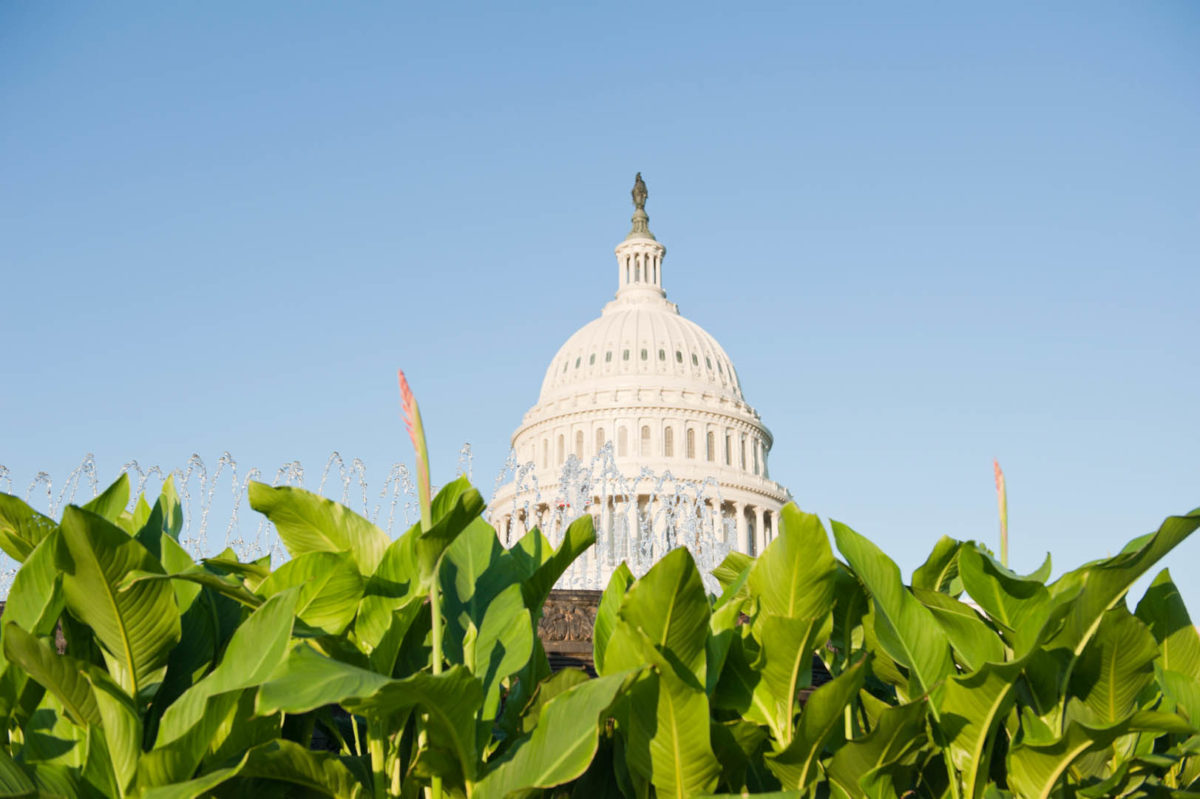
FOR IMMEDIATE RELEASE
January 26, 2023
Contact:
Aaron Smith, CEO and Co-founder
(303) 223-3554
Bethany Moore, Director of Communications
(303) 223-9727
Communications@TheCannabisIndustry.org
National Cannabis Industry Association Responds to FDA Statement on Cannabidiol (CBD) Regulation
The Food and Drug Administration concludes a new regulatory pathway is needed for CBD products; advocates call for swift congressional action on cannabis policy
Washington, DC – Today the Food and Drug Administration announced that it has concluded that regulations governing food and supplements would not be appropriate for Cannabidiol (CBD) products and that the agency will work with Congress to develop a new way forward.
Cannabis industry advocates are disappointed with this result after the FDA’s protracted study of the issue since 2019 but are hopeful the decision will put more pressure on Congress to move to sensibly regulate CBD and other cannabis products.
“Today’s announcement by the FDA underscores the urgent need for Congress and the Administration to take swift action to modernize federal cannabis policy and regulate CBD and other products appropriately and in harmony with the vast majority of states that have already legalized cannabis in some form,” stated Aaron Smith, National Cannabis Industry Association (NCIA) CEO and Co-founder. “A vibrant state-regulated industry has formed to safely provide cannabinoid products and medicines to millions of Americans, which has the support of the vast majority of U.S. voters. Moving forward with bi-partisan federal cannabis reform this year would be both good public health policy and good politics.”
In 2019, NCIA published the white paper Adapting A Regulatory Framework For The Emerging Cannabis Industry, which outlined recommendations for four “regulatory lanes” for cannabis products, including CBD and other non-psychoactive cannabinoids.
A November 2022 Gallup survey found that 68% of Americans support making cannabis legal for adults and a recent Pew Research Center poll found that less than 10% of Americans still support marijuana prohibition.
# # #
The National Cannabis Industry Association (NCIA) is the largest cannabis trade association in the U.S. and the only one representing small cannabis businesses at the national level. NCIA promotes the growth of a responsible, sustainable, and inclusive cannabis industry and works for a favorable social, economic, and regulatory environment for that industry throughout the United States.
Cannabis Administration and Opportunity Act Introduced in U.S. Senate
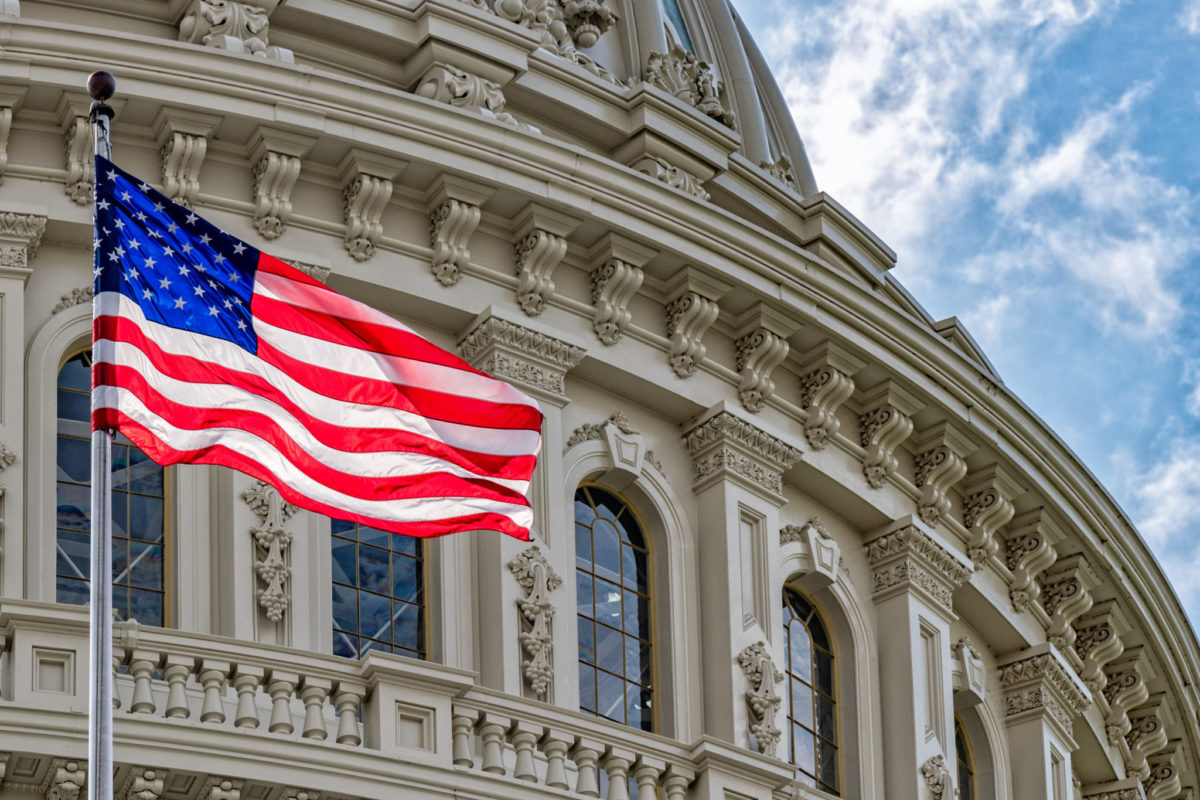
FOR IMMEDIATE RELEASE
Thursday, Jul 21, 2022
CONTACT:
Bethany Moore, Communications Director
(240) 678-2654, Communications@TheCannabisIndustry.org
Cannabis Administration and Opportunity Act Introduced in U.S. Senate
Legislation Would Institute Tax and Regulatory Structure for Legal Cannabis;
National Cannabis Industry Association Applauds Historic Measure, Concerned About Potential Impact on Small Businesses
WASHINGTON, D.C. – Today, Senate Majority Leader Chuck Schumer (D-NY) along with Finance Committee Chair Ron Wyden (D-OR), and Sen. Cory Booker (D-NJ) introduced the Cannabis Administration and Opportunity Act (CAOA) which is now the Senate’s only pending legislation that would provide comprehensive cannabis policy reforms across the nation.
The landmark bill would remove cannabis from the federal Controlled Substances Act and move regulatory responsibility from the Drug Enforcement Administration (DEA) to the Alcohol and Tobacco Tax and Trade Bureau (TTB), the Food and Drug Administration (FDA) and other agencies to protect public health and safety. The legislation would also allow the state-regulated medical and adult-use cannabis industries already in place in 37 states to operate without federal interference.
The Senate Democrats’ CAOA would also institute a federal excise tax of 5-25% on cannabis on top of the already-hefty state taxes imposed on the industry, concerning advocates for small cannabis businesses and equity operators.
“We applaud the authors of this legislation for working to bring federal law into harmony with the states and the vast majority of voters who have called for an end to prohibition,” said Aaron Smith, co-founder and chief executive officer of the National Cannabis Industry Association. “We look forward to working with Senators on both sides of the aisle to improve the tax provisions in this bill on behalf of small cannabis businesses and eventually pass it into law.”
The long-awaited CAOA Act was introduced after a bill sponsors circulated a discussion draft last year. NCIA and other advocacy organizations provided comprehensive feedback to the bill’s authors last year. Notable changes to the legislation include:
- Increases the permissible THC by dry weight from the current 0.3 percent to 0.7 percent and refines the definition of “hemp,” and consequently “cannabis” by taking into account the total THC in a cannabis product, rather than just delta-9 THC.
- Changes to the weight quantity to qualify a person for felony cannabis distribution or possession charge under the section from 10 pounds to 20 pounds.
- Provides that a court shall automatically, after a sentencing review, expunge each federal cannabis conviction, vacate any remaining sentence, and resentence the defendant as if this law had been in place prior to the original sentencing.
- Enables a noncitizen who has received a deportation order based on a cannabis-related offense to file a motion to reconsider that decision. If the motion to reconsider is filed within 30 days of the removal order, the motion may allow for cancellation of the deportation order.
- Establishes a new 10-year intermediary lending pilot program in which SBA would make direct loans to eligible intermediaries that in turn make small business loans to startups, businesses owned by individuals adversely impacted by the War on Drugs, and socially and economically disadvantaged small businesses.
- Removes the requirement to maintain a bond for any cannabis business that had less than $100,000 in excise tax liability in the prior year and reasonably expects excise tax liability in the current year to be below such amount.
- Incorporates rules similar to rules currently applicable to permitted malt beverage producers and wholesalers.
Whitney Economics submitted a report outlining concerns with the tax plan, finding that the CAOA would impose an additional $1.1 billion in taxes on the already-struggling and cannabis industry.
“Introducing this far-reaching bill is a historic and important effort but we hope that the Senate moves quickly to pass the bi-partisan SAFE Banking Act which would provide tangible and immediate relief to small businesses and improve public safety by opening access to banking and financial services in our industry,” added Smith.
The SAFE Banking Act has been approved by the House of Representatives seven times and the Senate version of the bill (S. 910) enjoys the support of a bipartisan group of 43 co-sponsors but has yet to be brought to a vote in that chamber.
Laws to make cannabis legal for adults have passed in 19 states as well as the District of Columbia and the territories of CNMI and Guam, and 37 states as well as several territories have comprehensive medical cannabis laws. The substance is legal in some form in 47 states.
###
The National Cannabis Industry Association (NCIA) is the largest cannabis trade association in the U.S. and the only organization broadly representing cannabis-related businesses at the national level. NCIA promotes the growth of a responsible and legitimate cannabis industry and works toward a favorable social, economic, and legal environment for that industry in the United States.
U.S. House Approves MORE Act to End Federal Cannabis Prohibition for Second Time

Bill would remove cannabis from list of controlled substances, expunge federal convictions, provide resources to small businesses and impacted communities
WASHINGTON, D.C. – The Marijuana Opportunity, Reinvestment, and Expungement (MORE) Act, which would remove cannabis from the federal Controlled Substances Act and attempt to undo the damage caused by racially and economically disproportionate enforcement of prohibition, was approved by the House of Representatives today. An earlier version of the bill was passed in December 2020 in a largely party-line vote, becoming the first comprehensive cannabis policy reform legislation to receive a floor vote or be approved by either chamber of Congress.
Revisions from last session include the removal of a provision that would have allowed federal regulators to deny cannabis business licenses to applicants who have prior felony convictions. Other changes from the introduced text this session include revisions to property requirements, allowing operators to secure those locations after receiving a federal license.
A number of amendments were offered at a Rules Committee hearing to advance the bill, however, only three were ruled in order. The first passed on a roll call vote and was introduced by Rep. Josh Gottheimer (D-NJ), authorizes $10M for the National Highway Traffic Safety Administration to conduct a study on technologies and methods that law enforcement may use to determine whether a driver is impaired by marijuana.
Another amendment, introduced by Rep. Conor Lamb (D-PA). This amendment directs the National Institute for Occupational Safety and Health (NIOSH) to conduct a study on the impact of legalization to the workplace, using states that have legalized recreational use of cannabis as a guide, and requires NIOSH to develop best practices for employers as companies transition their policies related to cannabis, prioritizing employers engaged in federal infrastructure projects, transportation, public safety, and national security. Additionally, it directs the Department of Education to conduct a study on the impact of legalization to schools and school aged children, using states that have legalized recreational use of cannabis as a guide, and requires the Department of Education to develop best practices for educators and administrators to protect children from any negative impacts.” It passed on a roll call vote.
Another amendment, which failed on a roll call vote was offered by Rep. Jamie Raskin (D-MD) would have required federal agencies to review security clearance denials going back to 1971 and retroactively make it so cannabis could not be used “as a reason to deny or rescind a security clearance.”
While there is currently no companion bill in the Senate, Majority Leader Schumer (D-NY) along with Senators Booker (D-NJ) and Wyden (D-OR) are expected to introduce a comprehensive cannabis reform bill in the next month.
“With voter support for legal cannabis at an all-time high and more and more states moving away from prohibition, we commend the House for once again taking this step to modernize our federal marijuana policies,” stated NCIA Chief Executive Officer and co-founder Aaron Smith. “Now is the time for the Senate to act on sensible reform legislation so that we can finally end the failure of prohibition and foster a well regulated marketplace for cannabis.”
Laws to make cannabis legal for adults have passed in 18 states as well as the District of Columbia and the territories of CNMI and Guam, and 36 states as well as several territories have comprehensive medical cannabis laws. The substance is legal in some form in 47 states.
###
The National Cannabis Industry Association (NCIA) is the largest cannabis trade association in the U.S. and the only organization broadly representing cannabis-related businesses at the national level. NCIA promotes the growth of a responsible and legitimate cannabis industry and works toward a favorable social, economic, and legal environment for that industry in the United States.
House Judiciary Committee Approves Bill to End Federal Cannabis Prohibition

MORE Act – approved in House floor vote last year – would remove cannabis from schedule of controlled substances, expunge convictions, and help repair harms caused by outdated policies
WASHINGTON, D.C. – On Thursday, the House Judiciary Committee approved a bill that would remove cannabis from the schedule of controlled substances and end the state-federal conflict that currently exists in the majority of states which have regulated cannabis in some fashion. The Marijuana Opportunity, Reinvestment, and Expungement (MORE) Act, or H.R. 3617, was reintroduced by House Judiciary Chairman Jerrold Nadler (D-NY) and has 74 cosponsors.
In addition to removing cannabis from the Controlled Substances Act, the bill would expunge non-violent federal cannabis convictions and support state efforts to do the same, provide opportunities and resources for cannabis businesses owned by women and people of color, create reinvestment programs for communities that have been adversely impacted by prohibition, improve immigration laws related to cannabis, and allow doctors in the Veterans Affairs system to recommend medical cannabis to their patients.
The MORE Act was originally approved in a full House vote in December 2020, becoming the first bill to end federal prohibition to pass in either chamber. A companion bill was introduced in the Senate by now-Vice President Kamala Harris, but did not receive a hearing before the end of the session.
The current legislation must be considered or waived by several more committees of jurisdiction before it can be brought up for another floor vote.
“We are thankful that the House continues to pursue sensible cannabis policy reforms and is once again moving on this important bill,” said Aaron Smith, co-founder and chief executive officer of the National Cannabis Industry Association (NCIA). “While the MORE Act lacks the robust regulatory structure we would like to see in a comprehensive descheduling bill, it represents the increasing support for ending prohibition among both lawmakers and the American public, not to mention the current policies of dozens of states around the country.”
“This bill would be a huge improvement on the status quo and is helping to further the conversation about what effective federal cannabis policy looks like,” Smith continued. “Removing cannabis from the Controlled Substances Act is absolutely necessary, and the MORE Act would be a big step in the right direction for restorative justice and making sure that small businesses and members of marginalized communities who have been disproportionately harmed by prohibition can benefit from the opportunities created by regulated cannabis markets.”
NCIA originally released recommendations for a federal regulatory framework in October 2019 and has been working with lawmakers to include them in comprehensive cannabis policy reform bills. Many of these ideas were incorporated in the draft language of the Cannabis Administration and Opportunity Act, which was released in July by Senate Majority Leader Chuck Schumer (D-NY) and Senators Cory Booker (D-NJ) and Ron Wyden (D-OR). NCIA provided significant feedback developed with members and stakeholders from across the cannabis industry and will continue to work with sponsors to pass legislation that undoes as much of the damage caused by prohibition as possible, protects small businesses, and ensures that a well-regulated cannabis industry can reach its full potential in the United States.
Laws to make cannabis legal for adults have passed in 19 states as well as the District of Columbia and the territories of CNMI and Guam, and 36 states as well as several territories have comprehensive medical cannabis laws. The substance is legal in some form in 47 states.
###
NCIA Submits Comments on Comprehensive Cannabis Policy Reform Proposal
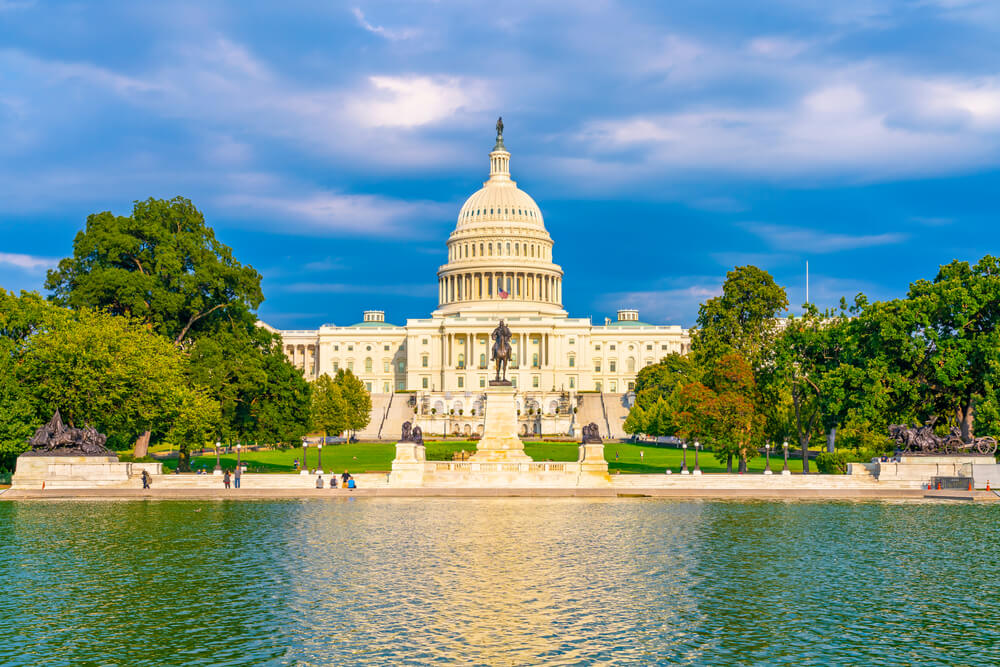
Critical analysis and recommendations from stakeholders developed in response to draft language of the Cannabis Administration and Opportunity Act led by Senate Majority Leader
WASHINGTON, D.C. – In response to a call for input on the draft language for a bill that would make cannabis legal and regulated at the federal level, the National Cannabis Industry Association (NCIA) has submitted a detailed analysis and recommended improvements on behalf of the legal cannabis industry. The Cannabis Administration and Opportunity Act (CAOA), submitted in July by Senate Majority Leader Charles Schumer (D-NY) and Senators Cory Booker (D-NJ) and Ron Wyden (D-OR), would remove cannabis from the schedule of controlled substances, create a regulatory structure and federal guidelines for cannabis products and state-legal markets, and is intended to support restorative justice for the people and communities that have been disparately hurt by prohibition while ensuring fair opportunities in legal cannabis markets for small businesses and marginalized communities.
The full comments are available here and an executive summary can be viewed here.
As the nation’s oldest, largest, and most broadly representative cannabis trade association, NCIA was able to draw on the vast experience of its members to create recommendations that will help to further promote the ideas that should be included in comprehensive federal policy reform, such as descheduling, support for small businesses, social equity and restorative justice, sensible federal guidelines, fair taxation, and research. These comments were developed with significant feedback from NCIA’s Policy Council, industry expert committees, social equity scholarship recipients, and other member stakeholders from every sector of the industry.
“Ending nearly a century of disastrous prohibition policies is a monumental effort and one which should not be taken lightly,” said Aaron Smith, co-founder and chief executive officer of NCIA. “We appreciate Senate leadership for taking a big step toward that goal which a significant majority of Americans support. There is a lot of work left to be done and it is vital to include those most impacted by both prohibition and the proposed legislation in this process.”
The CAOA presents a thoughtful foundation for comprehensive cannabis policy reform that clearly illustrates the authors’ engagement with stakeholders during the drafting process. Many of the ideas expressed in the draft legislation hew closely to NCIA’s recommendations for an effective federal regulatory framework. The Senate supporters demonstrated their commitment to continued discussion and revision by requesting public comments on this language immediately after it was initially released.
“It’s been gratifying to see NCIA’s’s previous regulatory proposals reflected in the four corners of the CAOA,” said Khurshid Khoja, chair of NCIA’s Board, co-chair of its Policy Council, and founder and CEO of Greenbridge Corporate Counsel PC. “I’m even more pleased that the authors’ offices have given us the opportunity to further inform and shape this landmark bill with robust industry input collected from a broad array of NCIA stakeholders.”
Despite this promising step in the conversation on how to best deschedule cannabis, there are a number of issues presented in the draft that could undermine the stated intent of the legislation and its authors in the Senate, as well as pertinent policies that go unaddressed. In particular, there are serious concerns that the suggested tax structure and other financial rules will result in even more onerous financial burdens than those which currently exist under prohibition and which will fall disproportionately on small businesses. This would limit the opportunities created by legal cannabis markets and hamper efforts to support restorative justice and social equity in the cannabis industry at the state and federal level. A detailed analysis of the proposed tax structure by Whitney Economics is available here.
“Cannabis reform is a complex task, but one that is crucial to get right,” said Michael Cooper, co-chair of NCIA’s Policy Council and managing partner at MadisonJay Solutions LLC. “As the nation’s largest trade association for the cannabis industry, NCIA is submitting these comments and looks forward to continuing to work with the impending legislation’s sponsors to make this reform as effective and impactful as possible.”
NCIA is committed to ending prohibition and repairing the harms it has caused while creating a vibrant legal industry that can sustain hundreds of thousands of well-paying jobs and become a major economic engine for America in the decades ahead. We are confident that congressional offices share this commitment with NCIA and trust they will seriously consider this feedback and that of our advocacy and industry allies.
Laws to make cannabis legal for adults have passed in 19 states as well as the District of Columbia and the territories of CNMI and Guam, and 36 states as well as several territories have comprehensive medical cannabis laws. The substance is legal in some form in 47 states.
###
Senate Leadership Releases Draft Legislation to Make Cannabis Federally Legal

Bill would remove cannabis from schedule of controlled substances, establish federal regulatory framework, protect state autonomy, and help repair harms caused by prohibition
Legislation opens doors for cannabis policy reform in the current Congress
WASHINGTON, D.C. – Senate Majority Leader Chuck Schumer (D-NY), along with Sens. Cory Booker (D-NJ) and Ron Wyden (D-OR), released draft legislation today that would remove cannabis from the schedule of controlled substances while allowing states to determine their own cannabis policies. The proposed plan would also establish a regulatory framework for state-legal cannabis businesses, expunge non-violent cannabis convictions, and create programs to support small and minority-owned cannabis businesses while reinvesting resources in the communities that have been disproportionately harmed by prohibition.
You can find a summary here and the full draft language here.
The Senate sponsors held a press conference on the draft bill today which can be viewed here.
“As Majority Leader Schumer noted today, this is a momentous occasion. This is the first time that the leadership of the upper chamber has championed a bill to end federal cannabis prohibition, and the fact that it is being done in such a thoughtful and proactive manner, engages stakeholders, and includes robust social justice and regulatory language is revolutionary,” said Aaron Smith, co-founder and chief executive officer of the National Cannabis Industry Association. “Given the political environment in the Senate right now, our focus will be to explore ways to potentially improve the bill and gain Republican votes – particularly from those lawmakers representing states where cannabis is legal in some form – while we shore up Democratic support. This draft legislation is a great vehicle to jumpstart these conversations and find common ground across the political spectrum.”
At the press conference announcing the draft legislation, Sen. Booker noted that he would oppose any consideration of incremental measures that would provide safe harbor for financial institutions to offer services and loans to cannabis businesses prior to the passage of a more comprehensive legalization bill.
“We absolutely share Sen. Booker’s desire to enact comprehensive reform as soon as possible, but we also recognize – as do the sponsors of this legislation – that the status quo disproportionately hurts marginalized communities and small businesses, and that getting the bipartisan support necessary for passage in the current term is far from certain,” continued Smith. “Closing the door on broadly supported incremental reforms like the SAFE Banking Act while the Senate seeks compromise on farther-reaching bills hurts the possibilities for consensus and ignores the very real needs of small business operators who have repeatedly said that access to banking services and traditional lending is an existential issue. Big companies already have access to these services, and delaying that same access for small businesses would not further the goal of fostering a more diverse and inclusive industry. These efforts are not mutually exclusive, and history has shown that when it comes to cannabis, every step in the right direction builds momentum for bigger and better reforms at the state and national level.”
A recent study by The Initiative reported that access to capital was the top concern of social equity cannabis operators.
Laws making cannabis legal and regulated for adults have been passed in 19 states as well as the District of Columbia and the territories of CNMI and Guam, and 36 states as well as several territories have comprehensive medical cannabis laws. The substance is legal in some form in 47 states.
###
NCIA Releases Overview of Cannabis Medical Knowledge
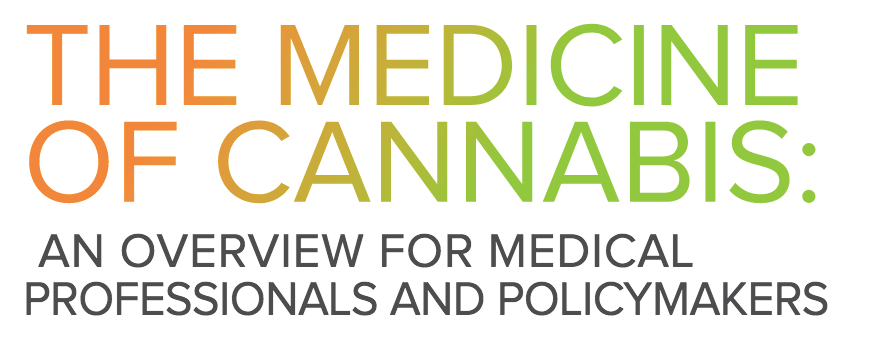
Summary intended to educate and guide policymakers and medical professionals
WASHINGTON, D.C. – The National Cannabis Industry Association (NCIA) has released an overview designed to help inform and guide policymakers and medical professionals on the science, history, and uses of medical cannabis and promote policies that facilitate further research and fair, legal access. This publication was developed by scientists and doctors working with NCIA’s Policy Council.
The objective of this report is to provide medical professionals and policymakers with an up-to-date, science-based perspective on the medicine of cannabis in the United States. It includes input from medical doctors, researchers, veterinarians, and policy experts, all committed to the development of a cannabis industry founded on scientific research, patient safety, and equitable access to safe products and clinical oversight. It includes a history of medical cannabis, an overview of the endocannabinoid system and the complex nature of the cannabis plant, and explores clinical uses as well as safety considerations. The paper also highlights the obstacles that currently hinder research, and includes policy recommendations to remove those barriers and promote evidenced-based therapeutic cannabis access and use.
The full paper is available here.
“Despite the well-established medical efficacy of cannabis and the overwhelming public support for regulating the substance, many politicians and doctors still lack a basic understanding of the science of cannabis and continue to oppose sensible reforms,” said Aaron Smith, co-founder and chief executive officer of the National Cannabis Industry Association. “We hope to provide a fundamental and balanced overview of the medical impacts and therapeutic uses of cannabis to the people who so often hold the keys to safe and legal access.”
NCIA intends to disseminate this overview to members of Congress and the Biden administration, as well as key federal agencies and medical organizations.
A recent Pew Research poll showed that 91% of U.S. adults think cannabis should be legal for medical purposes. A Gallup poll from late last year showed a record 68% national support for making cannabis legal for adults.
Cannabis is legal for adults in 17 states as well as the District of Columbia and the territories of CNMI and Guam, and 36 states as well as several territories have comprehensive medical cannabis laws. The substance is legal in some form in 47 states. Dozens of states are considering cannabis policy reform legislation this year.
###













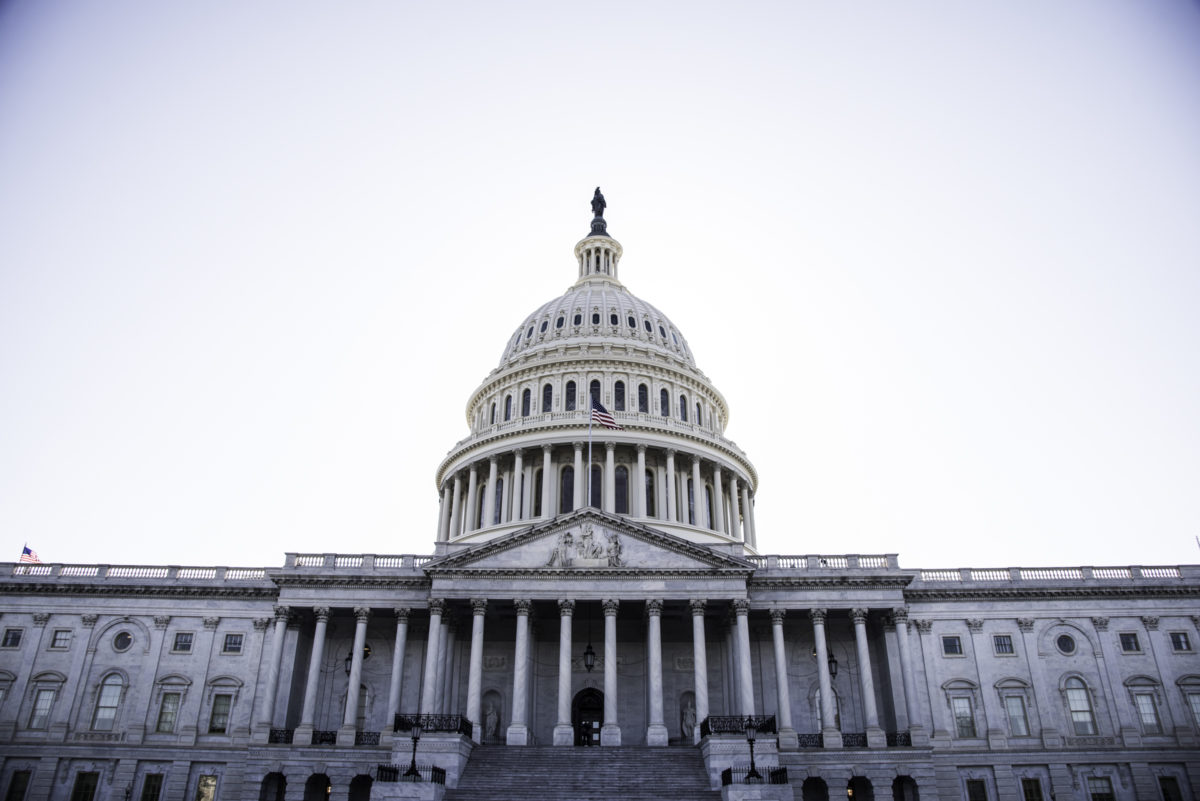






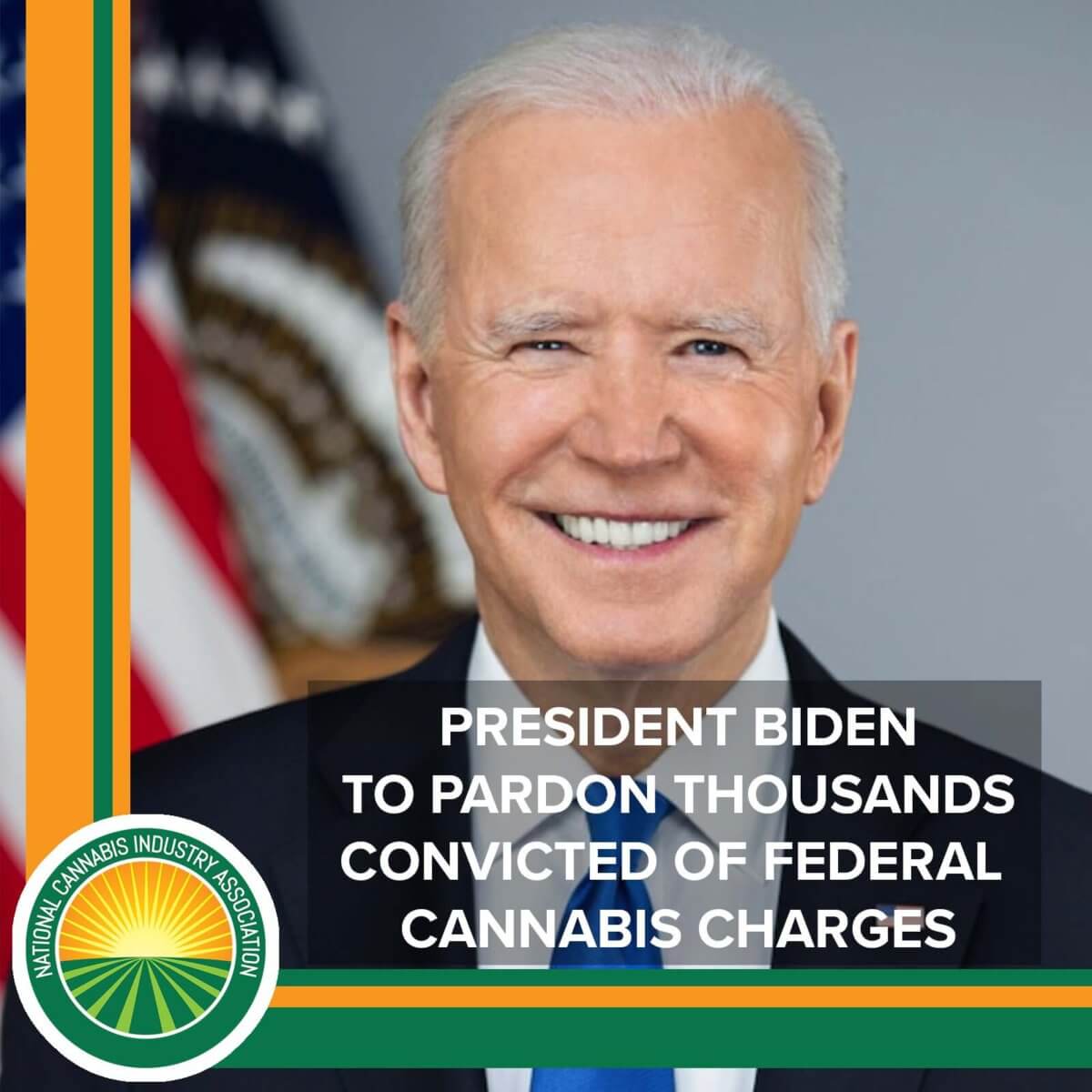



Follow NCIA
Newsletter
Facebook
Twitter
LinkedIn
Instagram
News & Resource Topics
–
This Just In
Rooted in Community: Vlasic Labs
Announcing Winners of NCIA’s State Regulatory Committee 2025 CannaStar Awards